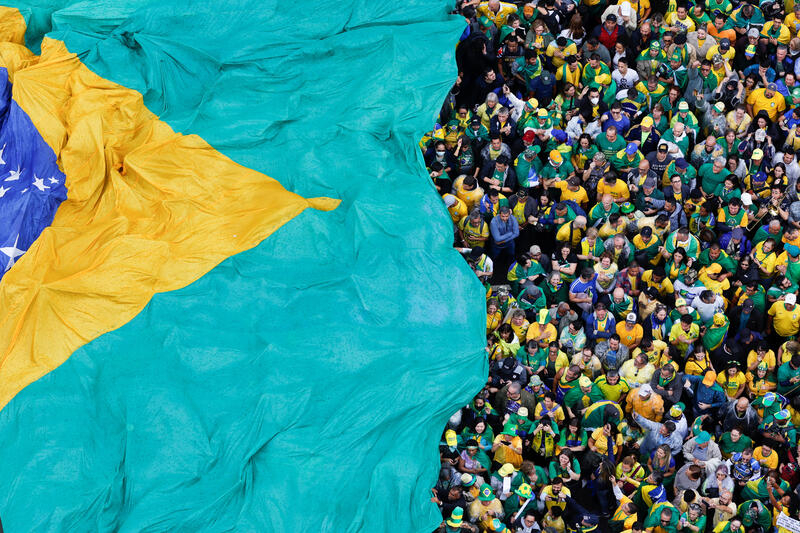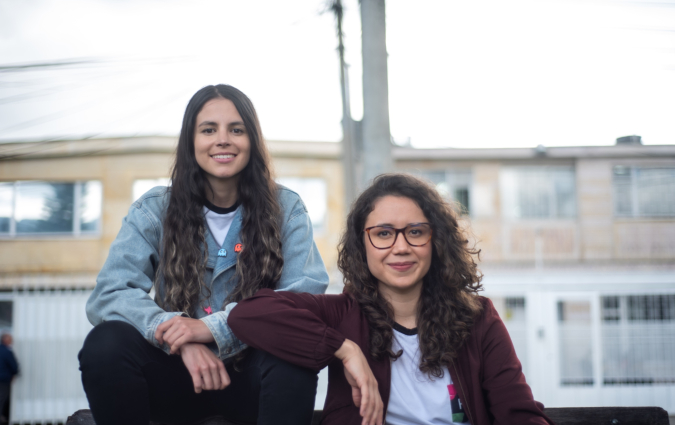Despite efforts to fight falsehoods, Brazil's tight election is threatened by dangerous lies

Supporters of Brazil's President Jair Bolsonaro gather during Independence Day in Sao Paulo. REUTERS/Amanda Perobelli
Brazil is approaching yet another presidential election still puzzled by what happened in 2018, when the country confronted the destructive power of falsehoods turbocharged by the tools of the digital age. Lies and manipulation have always played a role in election campaigns. But the depths reached four years ago presented the country with a challenge that will have to be addressed in the coming decades.
Despite the initiatives of democratic institutions and independent news organisations, Brazil's efforts to tackle misinformation only scratch the surface of a formidable challenge. Although the leading digital platforms agreed with Brazilian courts to enforce tighter controls over the dissemination of disinformation, practical outcomes still remain uncertain.
Strongly propelled by the wave of falsehoods that engulfed Brazil four years ago, President Jair Bolsonaro is now seeking a second term in office. He often denies any personal involvement with the disinformation ecosystem he benefits from and treats the lies with which his supporters flood social networks purely as "free speech".
The issue that dominates this year’s election is the electoral process itself. Even though President Bolsonaro was elected for 24 years through an electronic voting system (five times as congressman and once as president), he has spent his entire first term casting unfounded doubts about the digital ballot box. Without any proof, Bolsonaro has encouraged his supporters to spread conspiracy theories about the system, suggesting that it is vulnerable and that his reelection is threatened by alleged fraud.
These lies have become even more alarming at a time when former president Lula da Silva is ahead in the polls. By questioning the electoral system, Bolsonaro is preparing a convenient excuse for an eventual defeat, echoing the narrative adopted by US President Donald Trump in January 2021.
Researchers fights back
Inspired by a project developed in the United States, a group of Brazilian researchers founded "Democracia em Xeque" (Democracy at Risk) in February 2021. The initiative is led by academics from federal universities and aims to combat any misleading content threatening the integrity of the national electoral process. They constantly monitor the information that circulates on the main digital platforms and produce periodic reports.
The project’s most recent paper warned that the agreements signed between the main social networks and the Brazilian courts “are still modest in the face of the challenges presented by the hostile posture and the repeated attacks of the President of the Republic, his entourage, and the digital ecosystem that supports him.”
In February, Google, Facebook, Twitter, WhatsApp, Instagram, YouTube, TikTok and Kwai signed agreements with Brazil's Electoral Court and made a commitment to help tackle the spread of fake news. This commitment is based on reporting channels and the removal of false content. In June, a new and unexpected agreement was signed with Telegram, the favourite channel of Bolsonaro and his followers.
With no legal representative in Brazil until recently, Telegram spent months ignoring calls from Brazilian courts to debate its role in fighting misinformation. The company only decided to speak out after the Supreme Court threatened to suspend the use of the platform in the country. Bolsonaro was one of the first to rail against the measure. His official channel on Telegram has 1.4 million subscribers.
More charts on our report on 'The Trust Gap'
As the chart above shows, most Brazilians say misinformation is a problem on Google, Facebook, WhatsApp and YouTube. It is in these unofficial channels where lies, manipulations and attacks against the press often circulate and thrive. One of these groups recently shared that Lula da Silva would order the closing of all Protestant churches in Brazil after being elected. Bolsonaro is the favourite of Brazilian Protestants, a rising portion of the population in a country most of whose citizens are Catholics.
Content shared in these groups ranges from bizarre stories to subtle manipulations of the truth. One of the most recent messages in the “Bolsonaro Reeleito” (Bolsonaro Reelected) group (2,600 members) says that judge from the Supreme Court set up a private secret service similar to the Nazi Gestapo. The victim of the slander, judge Alexandre de Moraes, is in charge of the investigations into the proliferation of fake news in Brazil.
A well-oiled machine
Maria Paula Almada, a researcher at the Federal Institute of Science and Technology in Digital Democracy, says that the main obstacle when tackling the phenomenon in Brazil is "the high production [of falsehoods and the fact that they are posted and] made by different groups on several platforms.” She also points out that technology has made it possible to create more sophisticated manipulations, which makes fighting the problem even more challenging.
In recent weeks, for example, Bolsonaro's fans have shared a deep fake video in which the host of Brazil's leading TV show claims falsely that the President is leading the polls.
One could argue that it’s possible to watch the news to confirm that the information is false, but this is not as simple as it sounds. From the first day of his term as President, Bolsonaro, his allies and his supporters have led a permanent campaign against professional and independent journalism. The attacks range from offences and threats to journalists to boycotting campaigns against the main Brazilian TV channels and publications.
The attacks began even before the president took office when journalist Patricia Campos Mello revealed that business people aligned with Bolsonaro had financed a campaign of mass messaging on WhatsApp to discredit opponents. Since that episode, attacks on the press have escalated to previously unseen levels of ferocity and absurdity.
In this toxic environment, news that should have shocked the country began to be relativised by a sizeable part of the population, especially Bolsonaro's supporters. The argument is always the same: “It's all lies. The press doesn't like the president and is only concerned with attacking him.”
Considering this picture, it's not surprising that Brazil has been the country in which news avoidance has increased the most in recent years, according to the latest Digital News Report. The figures show that the number of news users who have started to avoid news has doubled in the last five years and reached more than half of the population.
In order to win back this audience, most of the big newspapers have improved their fact-checking services and have adopted a more modern and entertaining approach to the country's important issues. Individually or in consortiums, the companies have increased the monitoring of social platforms and the volume of information checked, but they still face demonisation campaigns.
Bolsonaro and his followers often criticise fact-checking organisations for their ties with the newspapers and accuse them of having a staff composed entirely of leftists. In Bolsonaro’s view, big news organisations and verification outlets are on the same side and against him.
"One mistake we made in the past was to imagine that the direct association with a renowned media outlet would lend us credibility. This did happen in the past, but today we realise that the brand impact may not have been so good," said Natália Leal, CEO of Agência Lupa, the first specialised fact-checking platform in Brazil.
Leal points out, however, that regardless of any ties to newspapers, there will always be attacks on those who hold powerful people to account. “It is important to keep in mind that journalism is a tool and misinformation is a problem for society as a whole. It is about the quality of the relationship between people and information”, she said.
Although on a much smaller scale, Bolsonaro is also a victim of disinformation produced and disseminated on leftist websites. One of the most common examples are the unfounded suspicions on the stabbing the president suffered in 2018, when he was still a candidate. When some of Bolsonaro's opponents' content is removed by the platforms, they also complain about censorship.
2018 vs 2022
While challenging, the scenario has improved since the last election. Most social platforms have begun to mark political messages as such, opened channels for users to report misleading content, and launched media literacy campaigns. WhatsApp, for example, has limited user’s interactions to stop indiscriminate mass messaging.
Researcher Maria Paula Almada argues that misinformation is not under control yet. “We are talking about a process of spinning wheels, but the platforms have signed agreements and are adjusting the terms,” she said in a phone conversation.
Almada’s main concern at the moment is YouTube. She said that the terms of use are vague, and there is no transparency about the standards for removing a video. A study by "Democracia em Xeque" shows that only 13% of a sample of 1,626 election videos posted on YouTube were tagged as election information. "This label is essential for the informational environment," the report says.
Leal, from Lupa, also thinks things have got better. "Alerts and tagging on social networks have become part of people's lives and this has contributed," she said. But the fact that misinformation is now more sophisticated pushes the challenge into the future.
"We have seen less disinformation than in 2018, but a more present threat. Disinformation strategies have been sophisticated, with more content bordering between truth and lies. It is also information that is more linked to emotional issues, to desires, things that stir people," she said.
On the institutional side, there has been some progress since 2018. A state legislator lost his job after being convicted of spreading false information about the electronic ballot boxes. In August, some of the businessmen who appeared in the report about WhatsApp bulk messaging were the target of a police raid, on suspicion of financing acts against democracy.
A recent study published in The Journal of Politics from the University of Chicago showed that 35% of Brazilian voters interacted and may have had their electoral choices influenced by fake news in the last presidential election. Researchers Felipe Nunes, Nara Pavão, Natália Bueno and Frederico Pereira pointed out the ineffectiveness of checking services and warned about the importance of pursuing a better understanding of the dynamics of fake news in different contexts.
For Leal, from Agência Lupa, journalism can help to depollute the environment by being more careful about its headlines, especially with the frequent use of quotes without proper contextualization. "This clickbait problem will only really change when we have a clearer business model, less dependent on advertising," she said.
The upcoming election in Brazil may help in this task by pointing out whether we are on the right path or whether we need to look for a new one. The only certainty is that the road is long and troubling. On 2 October Brazilians go to the polls.
Murillo Camarotto is a former Journalist Fellow of the Reuters Institute for the Study of Journalism. You can read his paper on local news in Brazil here.







